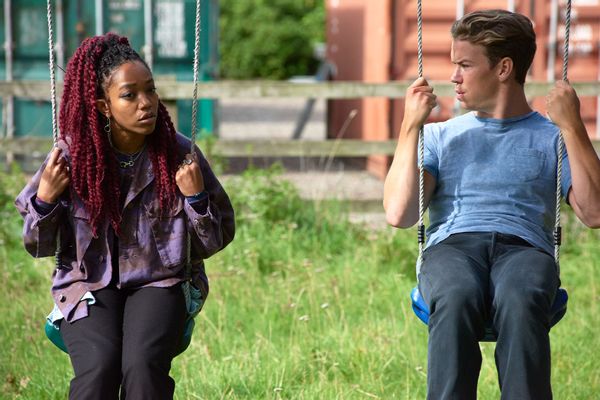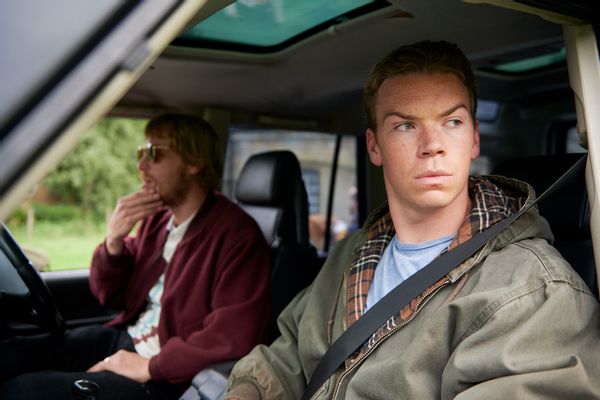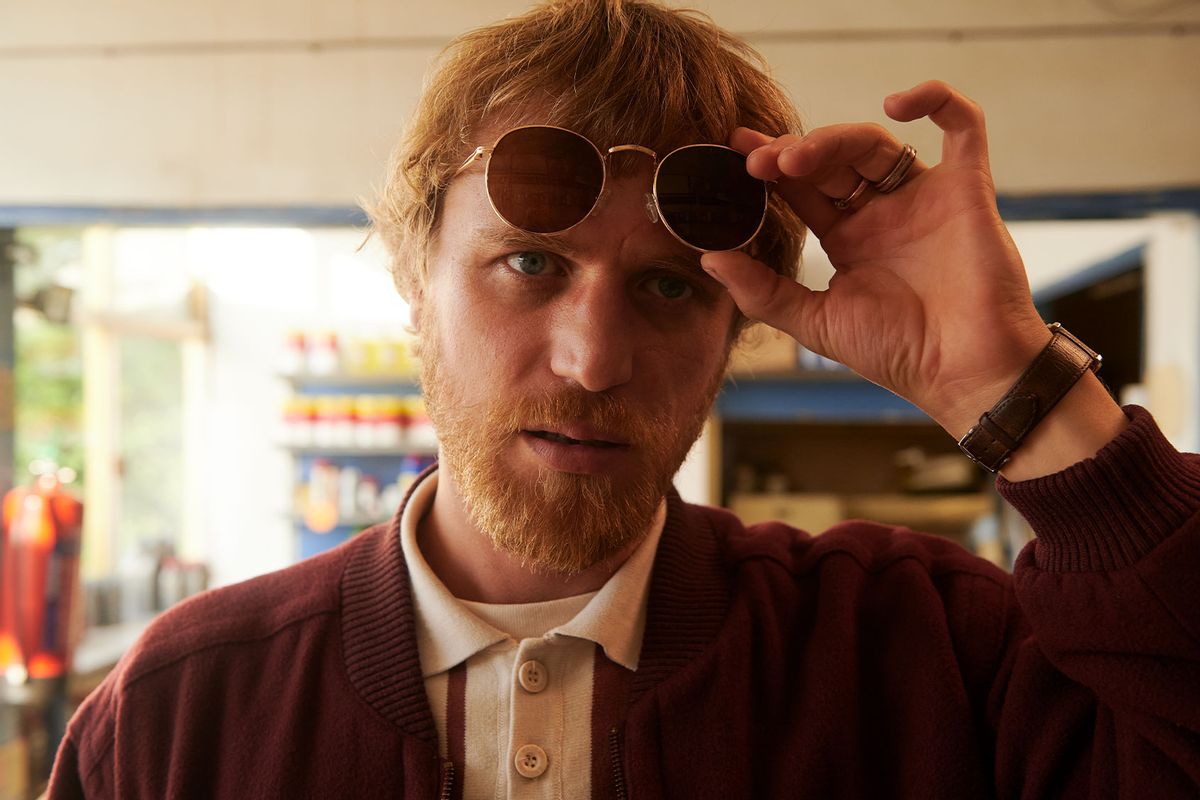The mercurial actor-musician Johnny Flynn — recently seen in "The Outfit," and who currently appears as Ian Fleming in Netflix's "Operation Mincemeat" — costars and composed the songs for the novel musical crime film, "The Score."
Flynn plays Mike, who along with Troy (Will Poulter), his best mate's younger brother, is hoping to make a score (find some stashed cash) at a roadside diner where the film largely takes place. However, as the contacts are delayed, Troy finds himself attracted to Gloria (Naomi Ackie) — much to Mike's chagrin. Flynn's character is all snark and cynicism, and the actor make his contempt towards Troy, as well as everyone from a gas station attendant, to Gloria, and the diner's few other customers, palpable (and sometimes justified).
"The Score" features the main cast singing soulful Flynn tunes that express their emotions, and one duet, "Brown Trout Blues" performed by Troy and Gloria, is particularly lovely. The romantic drama is all slow-burn as the film builds to its noir-tinged climax.
RELATED: "Emma." is the candy-coated "Clueless" remake we deserve
Flynn spoke with Salon about his new film and what drives him to both music and acting.
How did you become involved in "The Score"? Were you cast and then agreed to do the music? Or did music come before you were cast?
It is a strange series of coincidences really. I knew [director] Malachi Smyth for a while. He had this idea we should do a musical, and one day he asked to meet for a coffee. I knew nothing about the script being written or anything, and he gave me the script. I started reading it and on page one the characters are all singing "Barleycorn" by Johnny Flynn. I thought: What is going on? I realized it was a fully formed script with my songs written in. I was very intrigued. I privately had been thinking that one day I'd like to write a musical using my music. Do you remember that film, "Romance and Cigarettes?" I loved the way music was used in that film. I wanted to let my songs be portals into the characters' souls. Here was a script that was essentially doing that, but someone else had written it.
I really liked Malachi's script and the way the songs worked in the script. I was intrigued to see if we could make it work. He was very generous and let me give notes; I needed to respond in the spirit of all true collaboration. My understanding was that he wrote the script without the songs, and was happy with it, but he felt like something was missing and while he was writing the script he was listening to my music, and as a kind of midnight idea, he inserted some of my songs in a random way but also in an intentional way: This song might provide something at this moment. It was an experiment in auto-writing and seeing what comes out. When I read it, I never thought of this song in this context or energetic setting, but seeing it represent this young couple at a moment when they are coming together was really exciting.
 Naomi Ackie and Will Poulter in "The Score" (Gravitas Ventures)
Naomi Ackie and Will Poulter in "The Score" (Gravitas Ventures)
I love the scene where Troy and Gloria perform "Brown Trout Blues," which expresses so much for them. Can you talk about how a song you wrote is being used in a different context?
I loved seeing that gently choreographed dance routine come together. It's such a tender [scene] of two people discovering each other. My wife hates that song because we'd been together for years, and it was after we had an argument. It's a song about a long relationship but one where you are both learning about each other and thwarting each other and getting over that. There's a push and pull, but it's essentially someone saying, "I'm here for the long run." She thinks it's about us arguing. It is about arguing, but it's what makes us get better and grow, so to see [in "The Score"] a couple on the first day of their relationship and knowing it is about a long relationship is really beautiful. But I may be the only person who has that experience. I wrote that song when I was 18 and I'm 39 now.
A lot of these songs I don't remember what I thought they were about when I wrote them. The way I wrote songs is in a fairly abstract way. The poeticism of the lyrics is the specific muddied with the abstract. There is a lot of conjuring images that are an emotional vortex to move through. Each moment you sing or listen to the song you can project a bunch of different things. I don't want to be too proscriptive to what listeners should be seeing or feeling or thinking. I write songs with a big space for people to bring their own experience and how they are emotionally that day.
Want a daily wrap-up of all the news and commentary Salon has to offer? Subscribe to our morning newsletter, Crash Course.
What observations do you have about music and songs and storytelling?
That's why something like "Romance and Cigarettes" appeals — it's where songs you know are used in an interesting way. My father was in a lot of musicals when I was a kid, and I love the form of the musical. I haven't been a massive fan of modern musicals; I like classic musicals. My heroes are Irving Berlin and Cole Porter — those economic lyrists who nailed a sentiment in a scene through a song. These days, I feel like it is due for a reinterpretation or a revolution. I don't think I can revolutionize the form, but I'm really interested in playing with it. I wrote a radio musical which I'm developing into a theater piece.
Do you think you get cast because you are an actor who sings, or a singer who acts?
People perhaps go actor/composer/musician and put them together, and I just say yes. It's not so visionary. As I say yes, I think, "I could do something with this." I want to do something interesting and feel fresh even if it is on a small scale — putting something new into the world This project ticked all those boxes. The David Bowie movie was an opportunity to play with that form. Sometimes those opportunities, I have to admit, I'm so lucky that I happen to be the one person they can think of who can play guitar and sing and can sort of act. In acting, you don't have so much autonomy. Things come to you, and you either say yes or no, and they only come to you if you are lucky. The path you choose is in saying yes or no. I am just getting into the position where I can dream up something for myself and know enough people to put it together. My earlier projects were something lands in your lap, and this will be an adventure and I have to go on this ride.
What was cool about "The Score" was that they had done this with my songs. I wanted to rerecord the songs and have them completely reinterpret them. How the songs sound in the movie is so different from the original tracks on the record. There is a really different palette of instruments, and it was fun to revisit the songs with my band, who were around for the original sessions. We got a kick out of turning something into an electronic sound.
Working with Will and Naomi as vocalists was interesting because neither have careers doing that. They have fantastic voices, but it was the first time they were in a music studio with a producer recording a track, so it was coaching them. We had to do that before filming because we didn't have enough money for a "Les Miz" approach. We had to have the tracks down before the film. The producers and Malachi hadn't talked about the additional music, "the score for 'The Score,'" so I said I could do it, because I like making music, but that became a whole other chapter, scoring the scenes. I was writing the songs, recording the songs, rerecording the songs, shooting the movie. I'm inside it now and know the flow of this thing. For a small movie it was a very big undertaking for me.
 Johnny Flynn and Will Poulter in "The Score" (Gravitas Ventures)
Johnny Flynn and Will Poulter in "The Score" (Gravitas Ventures)
How did you create Mike's backstory, and what accounts for his character's contempt for everyone? Is he a victim?
I really relished playing someone with such a chip on his shoulder. The only way you could make it work is for him to be so cynical and so jaded. Through his own failures, which he's all too aware of, he's been walked all over. There's a deep, implied resentment that's been brewing because of how he was treated in his relationship with Troy's brother — that character is the ghost in the room. You have to have a tangible sense that he's got a point to prove, and he is out for himself. You want to empathize with him a little bit and not see him as a victim of circumstance for the story to work. I don't condone Mike's behavior, but you have to have a little bit of compassion for every characters you play even if you rationalize how they make the decisions in your life even if they lead to terrible things.
"The Score" has elements of a crime film, especially in the last act, where Mike gets to do some fighting and gets roughed up a bit. Are you a tough guy?
[Laugh] It is fun as an actor to do things you don't do in normal life, and I love working out. Choreographing a fight sequence and working with gag props that are rubberized is fun. It is still storytelling in the end. You are trying to be a magician and show a trick and not show what is behind the curtains. I also like driving in films, and if someone tells me I have to skid to a stop, I think I'm Steve McQueen. If I'm doing a fight scene, I think I'm Jackie Chan.
"The Score" releases in theaters on June 3 and on VOD on June 10.
More stories to check out:



Shares